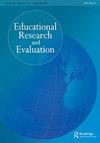Effective numeracy educational interventions for students from disadvantaged social background: a comparison of two teaching methods
IF 3.3
Q1 EDUCATION & EDUCATIONAL RESEARCH
引用次数: 2
Abstract
ABSTRACT The purpose of this study was to assess the effectiveness of explicit instruction, compared to constructivist instruction, in teaching subtraction in schools with a high concentration of students from a disadvantaged social background: eighty-seven second graders (mean age in months = 90.95, SD = 5.30). Two groups received explicit versus constructivist instruction during 5 weeks. Pre- and posttest analyses were conducted to compare the effects of the instruction type on subtraction skills taught through the partitioning subtraction method. Results showed that although all students progressed between both evaluations, those who received explicit instruction performed better. The findings from this study suggest that explicit instruction teaching is a promising approach in supporting the learning of mathematical knowledge for low-achieving students from disadvantaged social background. A larger scale study comparing the outcomes of children from different socioeconomic backgrounds would be needed to extend the applicability of the positive effects of this study.针对弱势社会背景学生的有效算术教育干预:两种教学方法的比较
摘要本研究的目的是评估显性教学与建构主义教学在一所学校的减法教学效果,该学校有87名来自弱势社会背景的学生(平均月龄= 90.95,SD = 5.30)。两组在5周内分别接受显性和建构主义教学。通过前测和后测分析,比较了教学类型对分划减法教学减法技能的影响。结果显示,尽管所有学生在两次评估之间都有所进步,但接受明确指导的学生表现得更好。本研究的结果表明,显性教学是一种很有前景的方法来支持来自社会弱势背景的低年级学生学习数学知识。需要进行更大规模的研究,比较来自不同社会经济背景的儿童的结果,以扩大本研究的积极影响的适用性。
本文章由计算机程序翻译,如有差异,请以英文原文为准。
求助全文
约1分钟内获得全文
求助全文
来源期刊

Educational Research and Evaluation
EDUCATION & EDUCATIONAL RESEARCH-
CiteScore
3.00
自引率
0.00%
发文量
25
期刊介绍:
International, comparative and multidisciplinary in scope, Educational Research and Evaluation (ERE) publishes original, peer-reviewed academic articles dealing with research on issues of worldwide relevance in educational practice. The aim of the journal is to increase understanding of learning in pre-primary, primary, high school, college, university and adult education, and to contribute to the improvement of educational processes and outcomes. The journal seeks to promote cross-national and international comparative educational research by publishing findings relevant to the scholarly community, as well as to practitioners and others interested in education. The scope of the journal is deliberately broad in terms of both topics covered and disciplinary perspective.
 求助内容:
求助内容: 应助结果提醒方式:
应助结果提醒方式:


